As someone who’s used ChatGPT daily since its launch in November 2022, I can’t deny its brilliance for many tasks. But when it comes to academic writing, I’ve consistently found it falling short — especially for research papers and scholarly essays.
I want to be upfront — this comparison appears on Blainy’s website, so you might expect bias. But I’ll show you exactly why Blainy outperforms ChatGPT for academic tasks through real test results and side-by-side comparisons.
I’ve spent months testing both tools, focusing on what matters most to students and researchers: citation accuracy, academic tone, and research capabilities.
Let’s explore why Blainy has become my go-to choice for academic writing — and why it might become yours too.
PS: While I work with Blainy, this review reflects my honest findings from extensive testing. I’ll back every claim with evidence.
ChatGPT is a general-purpose AI chatbot
ChatGPT shines at everyday tasks — I use it to polish emails, create quick tables, answer questions, and draft marketing plans. It’s like having a helpful assistant who’s always ready to chat.
But here’s the catch: ChatGPT is designed as a conversational AI, not a specialized academic tool. While it can discuss any topic, it often struggles with complex academic tasks unless you’re skilled at prompt engineering.
Think of ChatGPT like a Swiss Army knife — handy for many things but not ideal for specialized work.
In my experience, even with perfect prompts, it often:
- Mixes casual and formal tones in academic writing
- Creates inaccurate citations
- Struggles with complex research synthesis
- Provides outdated academic information
PS: Don’t get me wrong — I still use ChatGPT daily for general tasks. But for academic writing, you need a tool that speaks the language of academia.
Blainy: An AI Specifically Built for Academic Writing
Unlike ChatGPT’s general-purpose approach, Blainy uses specialized Large Language Models (LLMs) fine-tuned specifically for academic writing. Through my daily use of both tools, I’ve noticed how Blainy maintains consistent academic standards that ChatGPT often misses.
Academic writing demands a unique style that’s different from general content or SEO writing:
- Formal scholarly tone
- Evidence-based arguments
- Proper citations and references
- Field-specific terminology
- Structured argumentation
While ChatGPT can write basic content, Blainy understands academic conventions at its core. I’ve watched it maintain consistent scholarly language and proper citation formats — something I constantly have to correct when using ChatGPT for academic tasks.
Though Blainy also has a chatbot if you need
While Blainy focuses on academic writing, it also includes a powerful chat feature. I find it particularly useful because it lets me upload research PDFs and ask specific questions about them.
The chat analyzes my uploaded articles and provides answers with direct citations from those sources. For example, when I’m working on a research paper, I can upload relevant studies and ask, “What are the main findings about X?” Blainy then reviews the PDFs and provides answers using it.
This feature bridges the gap between AI assistance and proper academic research — you’re not just getting AI-generated answers, but responses backed by actual research materials.
Both apps have lots of cool features
Both ChatGPT and Blainy pack impressive features, but they serve different purposes. Here’s what I’ve discovered using both tools:
ChatGPT’s Standout Features:
- Code writing and debugging
- Language translation
- Creative writing assistance
- Math problem-solving
- General knowledge Q&A
- Basic content generation
Blainy’s Academic-Focused Features:
- AI writing suggestions for academic tone
- Smart autocompletion for scholarly terms
- Academic paraphrasing with proper citations
- Multiple citation style formats (APA, MLA, IEE, and Harvard)
- PDF document chat with source integration
- Academic plagiarism checking
The key difference?
ChatGPT offers broad functionality, while Blainy’s features target academic writing needs.
For instance, when Blainy suggests paraphrasing, it maintains academic language — something I often have to manually adjust with ChatGPT.
Blainy
Blainy is an AI academic writing platform that transforms how researchers and students approach their work. Unlike ChatGPT’s broad approach, Blainy specializes in scholarly content — from research papers to literature reviews.
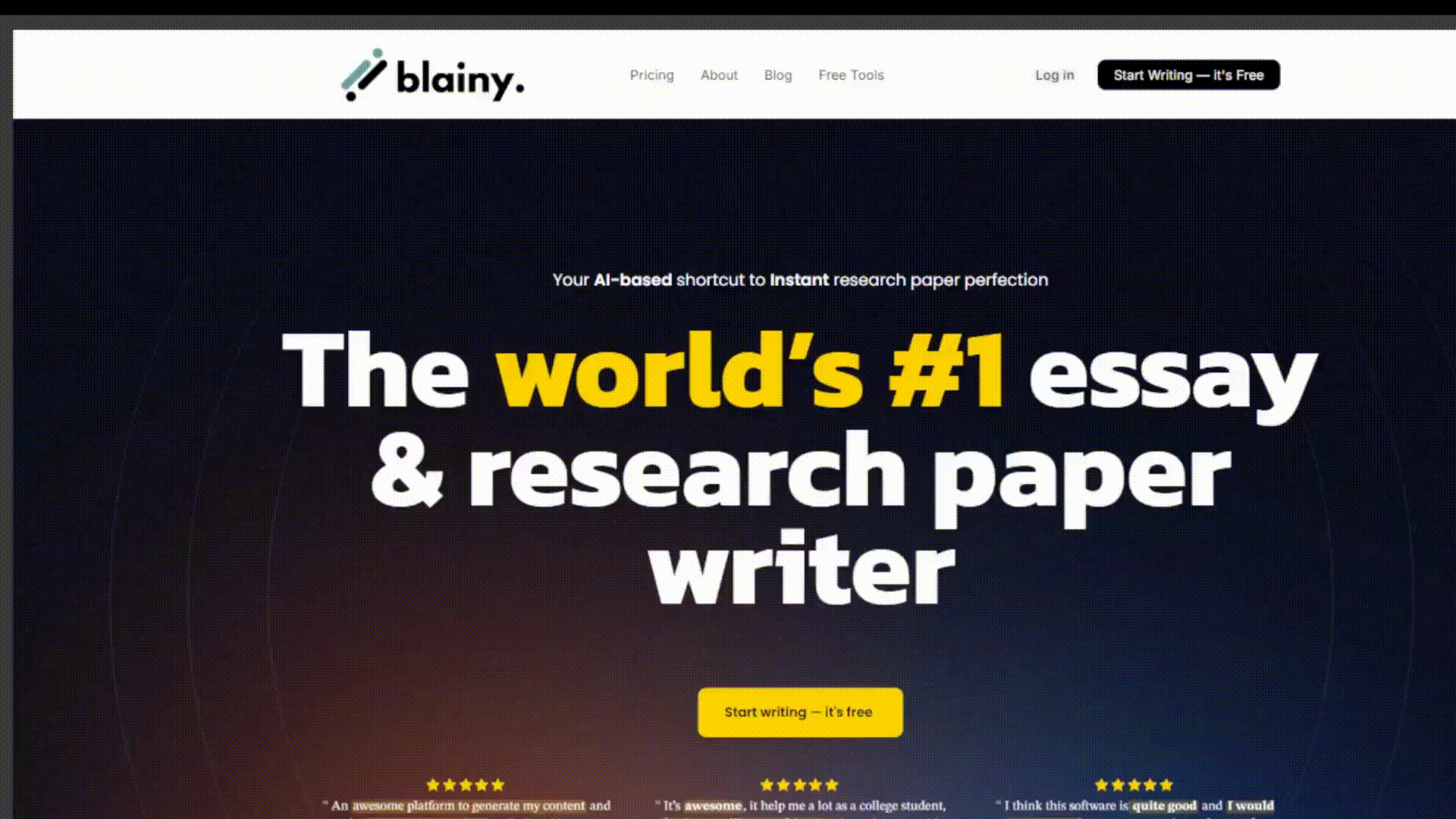
Key Features of blainy include:
- AI Suggestion
- AI Autocomplete
- Academic Paraphrasing
- In-Built Citation
- Document Chat
- Plagiarism Checker
What makes Blainy unique is its specialized Large Language Models (LLMs) trained specifically for academic writing.
Plus: Blainy’s free plan lets you test all premium features within the daily word limit, perfect for seeing if it fits your academic needs.
ChatGPT
ChatGPT is OpenAI’s versatile AI chatbot that handles everything from casual conversations to complex problem-solving. I’ve found it works like a knowledgeable friend who can help with various tasks — from coding to creative writing.
Key Features of chatgpt include:
- Natural Language Processing
- Code Generation and Debugging
- Math Problem Solving
- Language Translation
- Content Creation
- Basic Research Help
- General Knowledge Q&A
What sets ChatGPT apart is its flexibility and broad knowledge base. During my use, I’ve noticed it excels at breaking down complex topics into simple explanations and offering creative solutions to problems.
ChatGPT performs best in general writing and creative tasks. When I need quick answers or want to brainstorm ideas, it’s my go-to tool. However, for academic citations and research papers, it sometimes needs extra guidance to maintain scholarly standards.
Research shows ChatGPT frequently generates false citations and unreliable information. A 2023 study in Scientific Reports found that 55% of ChatGPT’s citations were completely fabricated, with many references containing made-up authors, titles, and journal details that don’t exist. Even real citations often contained errors in dates, page numbers, and other key details.
For example:
- It creates realistic-looking but fake journal articles
- It combines real author names in false collaborations
- It invents publication dates and page numbers
- It mixes real journal names with non-existent papers
This makes ChatGPT unreliable for academic writing, where accuracy and proper citation are essential.
ChatGPT vs. Blainy: Which should you choose for academic writing?
I ran five detailed tests using identical prompts on both ChatGPT and Blainy to evaluate their effectiveness specifically for academic writing.
Here’s what I discovered:
Blainy consistently prioritized academic standards, delivering structured outlines, accurate citations, and a scholarly tone. ChatGPT, while knowledgeable, tended toward a more casual style and required extensive prompting to achieve academic specificity.
This comparison highlights each tool’s strengths and limitations in academic settings.
Test #1: Essay Outline Generation
When it comes to generating a structured article outline, Blainy has a clear edge. With Blainy, all you need to do is input your title—no further prompting necessary. The tool automatically creates a well-structured, organized outline based solely on the title, catering to academic standards from the start.
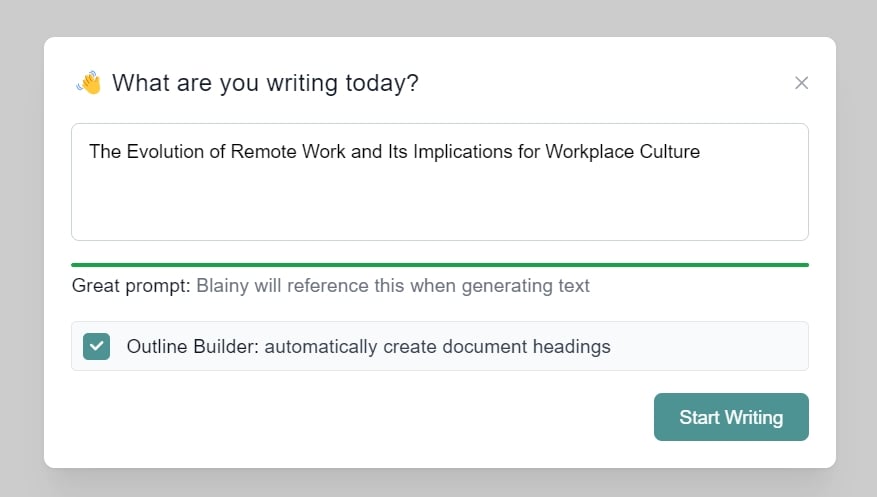
Blainy’s design ensures each outline aligns with an academic writing style, giving you a head start on creating content that fits a scholarly framework.
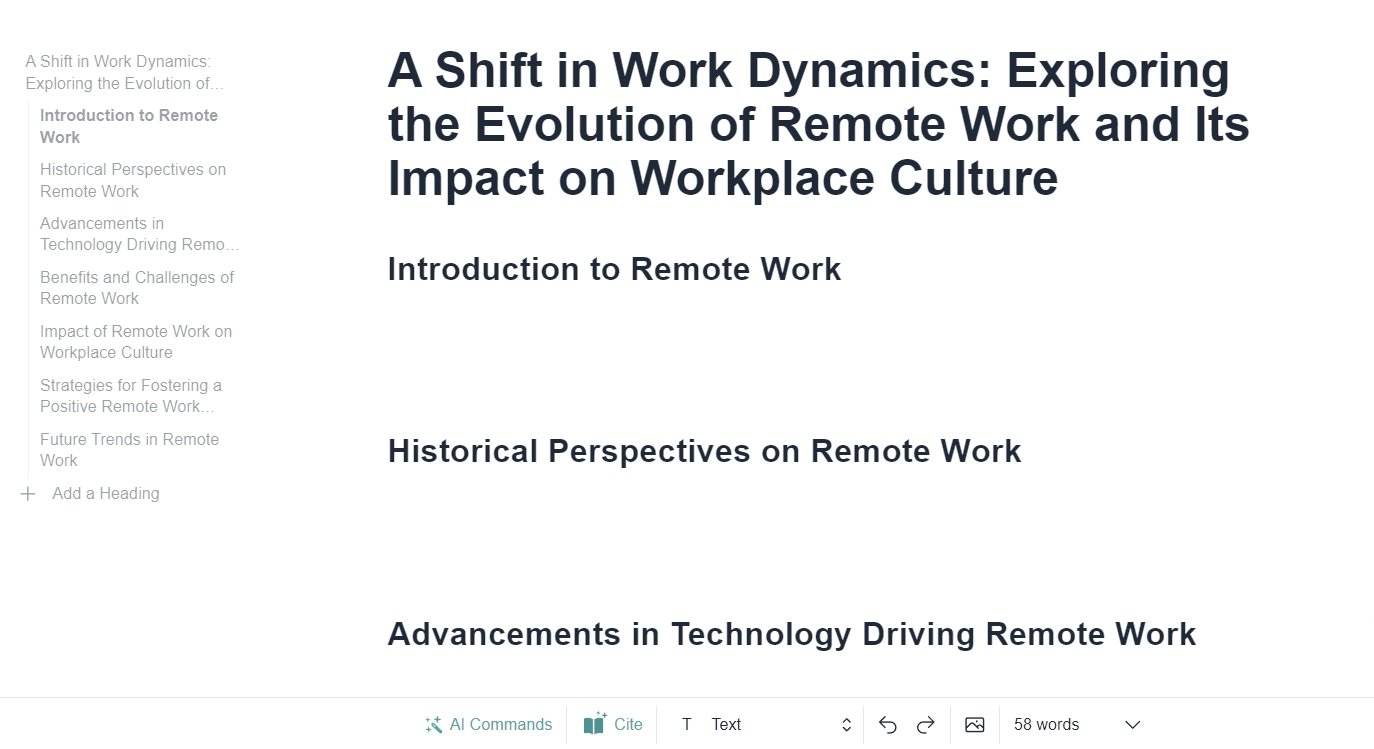
With ChatGPT, however, the process is a bit more hands-on. You’ll need to craft a detailed prompt, explaining your writing purpose, desired structure, and any specific guidelines for an academic format. This can take extra time and effort, and it doesn’t always guarantee the same structured quality that Blainy offers by default.
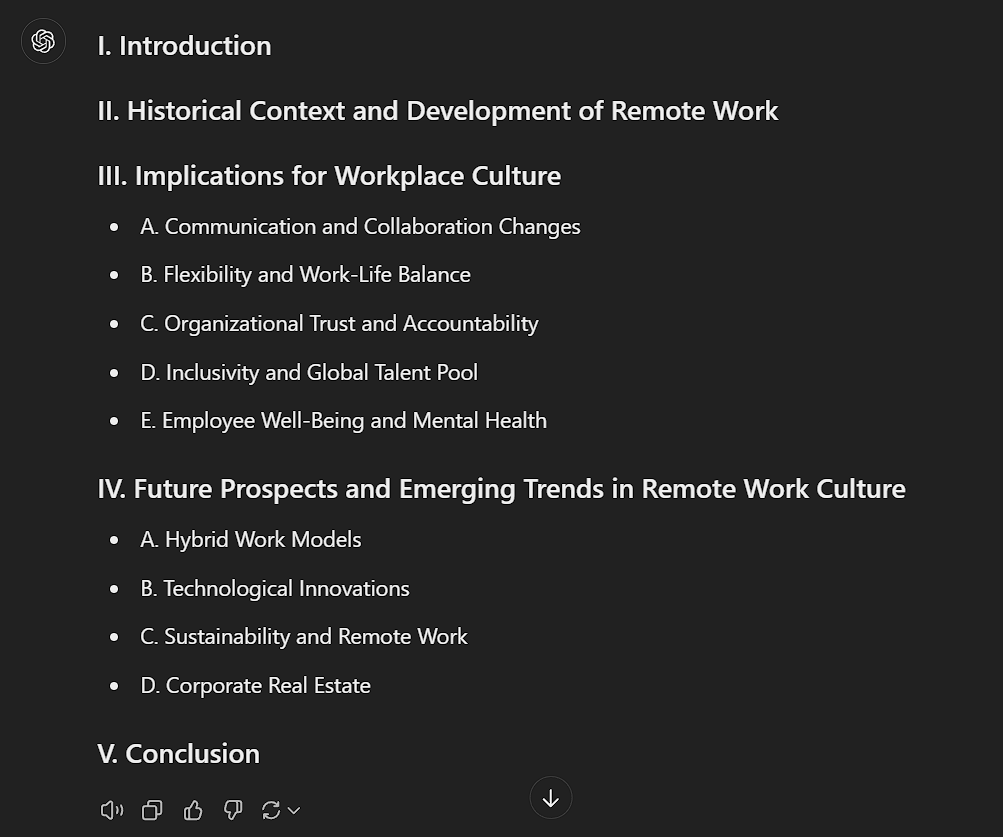
Test #2: Academic Writing
In our test, Blainy excelled at crafting content with a clear academic tone. Right from the first try, Blainy’s output adhered to the formal language and structured style typically expected in academic writing. This makes it an efficient choice for users aiming to generate scholarly content without additional adjustments.
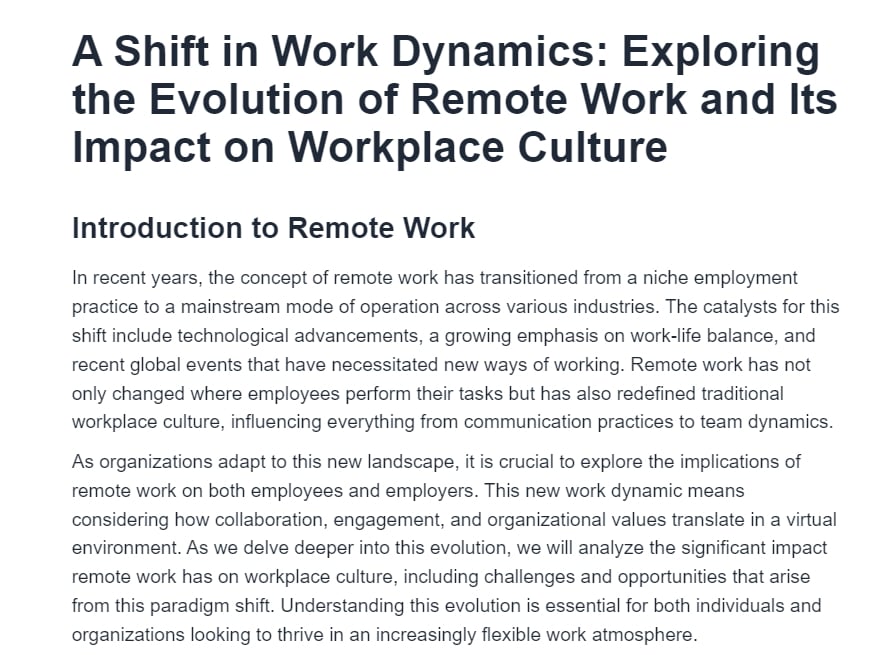
ChatGPT, on the other hand, struggled with maintaining a consistent academic tone. While it’s technically possible to make ChatGPT write in a formal style, doing so requires heavy prompting. Users would need to input specific instructions, refine, and sometimes re-test prompts, which can be time-consuming and may not be practical for everyone.
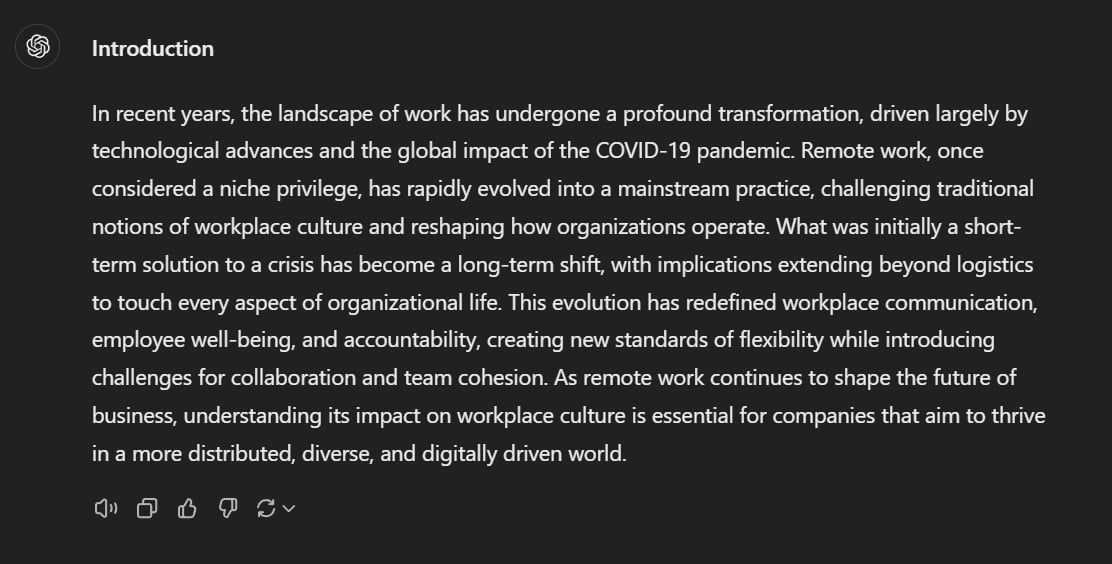
Test #3: Writing Suggestions
Blainy shines when it comes to overcoming writer’s block, thanks to its automatic AI suggestions. As you write, Blainy provides real-time prompts on what to tackle next, guiding the content flow seamlessly. This feature ensures you’re never stuck wondering what to add or how to proceed, making it a highly effective tool for uninterrupted writing.
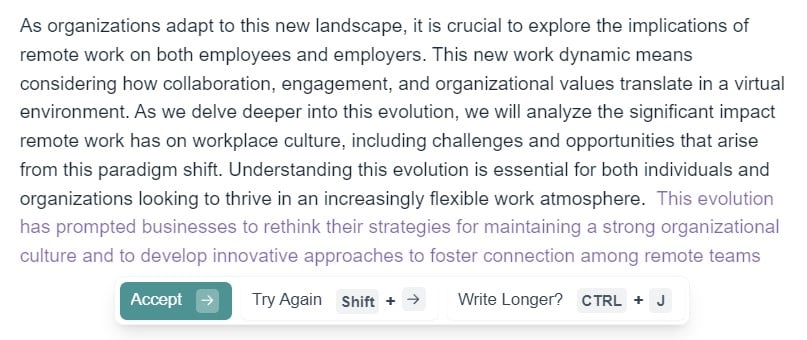
In contrast, ChatGPT lacks this automatic suggestion functionality. While you can prompt ChatGPT to provide ideas or guidance on what to write next, this requires additional effort and careful phrasing. Moreover, after a few exchanges, ChatGPT often starts to “hallucinate” or generate less accurate suggestions, which can disrupt the writing process.
Test #4: Document Chat
One of Blainy’s standout features is its ability to work directly with your uploaded documents, such as PDFs, research articles, or reports related to your essay or research topic. You can upload these files and ask specific questions about their content, and Blainy will generate accurate answers, even providing citations based on the source material. This functionality streamlines research and ensures that your responses are rooted in reliable sources.
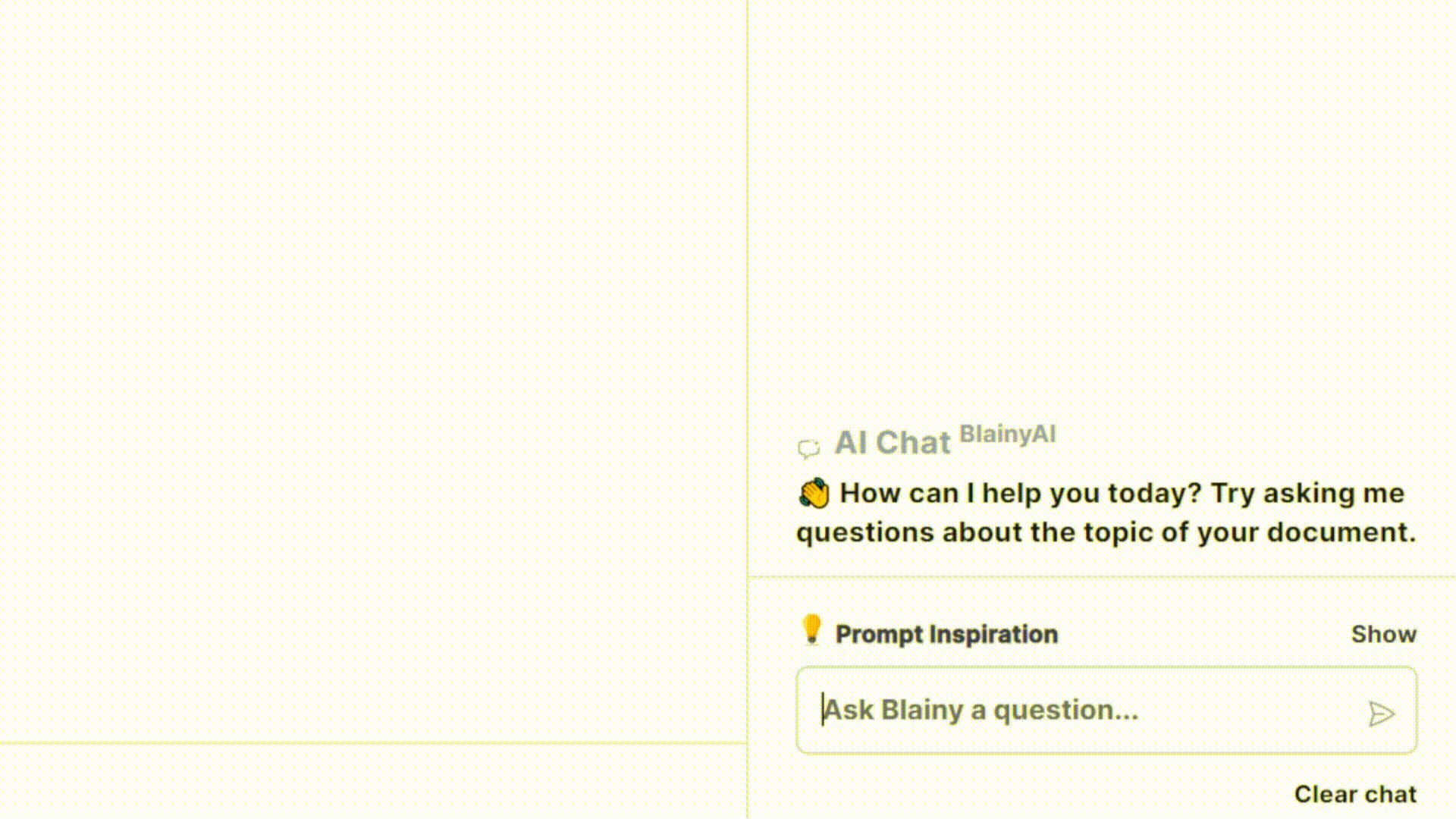
ChatGPT, by comparison, has limited capabilities in this area. While you can upload PDFs and ask ChatGPT to summarize or explain the content, it doesn’t cite sources from the uploaded material. ChatGPT also has a tendency to “hallucinate,” which means it can stray from the provided context and offer AI-generated answers rather than grounded responses. This can lead to factually incorrect or misleading information, especially if you’re relying on it for detailed, source-specific answers.
Test #5: Citations and Bibliography
Blainy is seamlessly integrated with an academic database, allowing it to pull data from a wide array of scholarly sources. It provides up-to-date article, journal, and website suggestions, even including the latest publications from 2024. With Blainy, you can insert in-text citations in formats like APA7, MLA9, IEEE, and Harvard with just one click. It also automatically compiles a bibliography in your chosen format, ensuring your citations are accurate, up-to-date, and effortlessly organized.
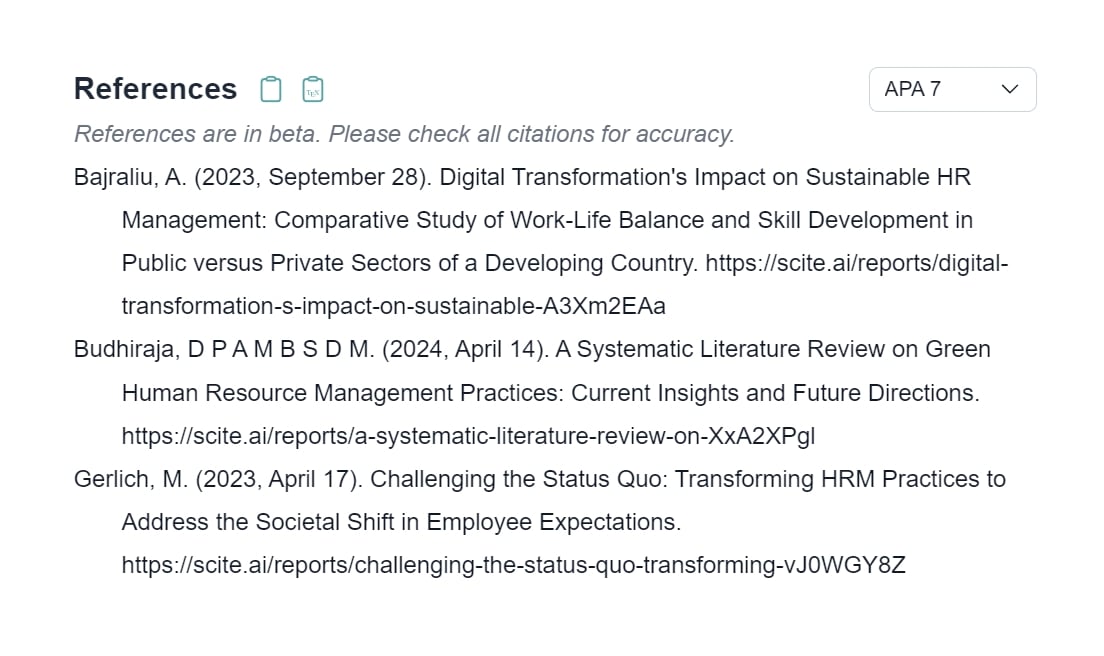
On the other hand, ChatGPT falls short in citation accuracy. Research highlights ChatGPT’s tendency to generate false or “hallucinated” citations. A 2023 study published in Scientific Reports found that 55% of ChatGPT’s citations were completely fabricated, often including fictitious authors, titles, or journals. Even real citations were prone to errors, such as incorrect dates or page numbers, which makes it unreliable for precise academic referencing.
The Verdict
While ChatGPT excels at handling general writing tasks and creative projects, Blainy consistently outperformed it in academic writing scenarios. Blainy’s academic-focused features—like automatic outline generation, AI writing suggestions, document chat capabilities, and a robust citation system—make it a more reliable choice for scholarly work. These tools save time and ensure accuracy, providing users with a smoother, more dependable academic writing experience.
When accuracy and academic integrity matter most—especially for research papers and thesis work—Blainy is the ideal choice.
P.S. Always verify AI-generated content, no matter which tool you’re using.
Best ChatGPT Alternative for Academic Writing
Through extensive testing of both ChatGPT and Blainy, I uncovered key differences in their performance when it comes to academic writing.
Here’s a breakdown of what each tool offers and where they diverge:
Core Differences:
- ChatGPT provides broad, general knowledge but often lacks the depth needed for academic rigor.
- Blainy is designed specifically for scholarly work, with features that support formal writing, citation accuracy, and academic structure.
- While both tools assist with writing, they cater to distinct purposes and audiences.
Key Findings:
- Research Tasks
- ChatGPT: Struggles with analyzing uploaded documents in detail and frequently generates unreliable citations.
- Blainy: Excels in handling research papers with accurate references and even provides relevant, up-to-date articles from academic databases.
- Writing Style
- ChatGPT: Leans towards casual, conversational language suitable for general topics but less suitable for academic standards.
- Blainy: Maintains a formal, academic tone, consistently adhering to academic formatting.
- Source Management
- ChatGPT: Tends to fabricate citations, leading to potential issues with academic integrity.
- Blainy: Produces precise, reliable citations, with easy access to in-text citation and bibliography features in multiple formats (APA, MLA, IEEE, etc.).
The Bottom Line: Based on these findings, Blainy is better suited for academic writing, while ChatGPT remains a powerful option for general content creation. Each tool has its strengths, depending on the specific writing needs.
Pro Tip: Test both tools yourself to determine which one best aligns with your writing goals.
P.S. Regardless of the platform, always review and verify AI-generated content for accuracy and integrity.







